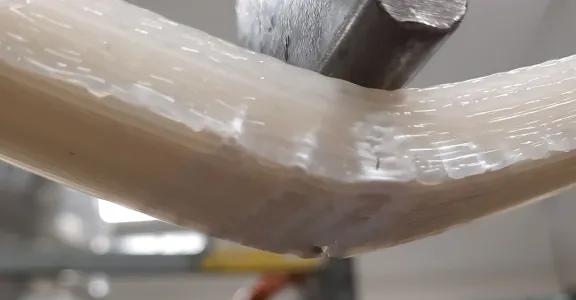Footprint inc. is a 3D-printing company that focuses on sustainable and circular materials. To support that mission, the organization wanted to enable customers to return their custom-made pieces, so they could be reused as raw printing materials. This required a thorough understanding of the recycling process: would it simply involve shredding, or would it require additional steps, such as remolding or additives? Footprint inc. teamed up with Sirris to test the entire chain.
A complex recycling process
Footprint inc. prefers to use polymers in their printing process, since this allows them to work with a variety of sustainable and biodegradable materials. However, recycling fiber-reinforced polymers is complex. Especially when using biological fibers, since they tend to char and degrade at temperatures.
To properly evaluate their recyclability, Sirris helped Footprint inc. devise and execute a pellet-extrusion testing process. They printed demonstration and sample parts, shred the samples, reprocessed the shredded polymer for recycling purposes, and evaluated their performance, processability, and printability.
Testing two materials
UPM: feeding issues and inconsistent flow rate
The base material for the testing process was UPM, a granulate compound of PLA (polylactic acid) filled with 20% cellulose fibers. The printed parts were shredded in two lots (tubular shreds and flakes), which were then mixed before reprocessing.
Unfortunately, extrusion tests with those shredded materials resulted in feeding issues. The machine would either jam, or extrude excessively or insufficiently. Improving the pellet shape helped smooth out the pellet flow to the extruder, but didn’t cause any improvements in printing behavior. Adding virgin polymers (up to 33%) was also unsuccessful.
The next step was a flow test of both virgin and recycled polymer at a constant temperature and screw speed. Virgin polymer exhibited a reliable flow rate and an extrusion process with an extremely low average, mean, and standard deviation (grams of printed material per minute). Recycled polymer, however, turned out to be much more inconsistent. The average and mean numbers of grams per minute were, respectively, up to 37% and three times lower than in virgin polymer. The standard deviation was three to four times higher.
Unfilled PLA 3D870: improvements and expected performance loss
Footprint inc. and Sirris then decided to repeat the flow test with a material without fibers: unfilled PLA 3D870. This is a bio-based grade of PLA with a high mechanical performance and glass transition temperature (Tg). Flexural strength samples were printed in both virgin and 100% recycled material.
The samples showed substantial stability improvements compared to UPM, so reuse wouldn’t require complex blends or extra reprocessing steps. They did indicate a performance loss of about 20%, though, which is likely attributable to a higher Melt Flow Rate (MFR) after the first processing. Additionally, their natural color would degrade, but that could be solved with pigment use.
The standard deviation of mechanical sample between virgin UPM (4.64%) and virgin 3D870 (5%) were very similar. After recycling, however, the standard deviation would jump to 23.18% for UPM and 8.67% for 3D870. UPM’s flow rate showed significant variations after recycling (up to 60%), while 3D870’s peaked at 14%.
Follow-up
The project offered valuable insights into the impact of fibers on polymers and their extrusion process post-printing and shredding. Printing recycled UPM led to an inconsistent flow – most likely due to fiber degradation, but that hasn’t been definitively confirmed yet. Unfilled PLA affected the extrusion process to a lesser extent.
This showed that restoring the materials’ original properties would require more than just mechanical processing. However, those reused materials could still be suitable for applications with lower quality requirements.
As a result, Footprint inc. will avoid fiber-reinforced materials as much as possible to prioritize mono-materials. Footprint inc. and Sirris will continue their collaboration to explore whether certain materials are better suited for mechanical recycling, and to study how print settings affect polymer degradation and recyclability.
Our experts for this innovation project
Henri Appeldoorn and Matthieu Dallenogare
Annual Report 2023: Another year of innovation!In 2023, we didn't just adapt, we innovated and elevated! From boosting innovation services to diving deep into energy transition and manufacturing, we've been busy. We completed over 1.200 innovation projects and highlighted 13 industrial cases in the annual report. And let's not forget our leap into Generative AI, which is a game-changer. |


